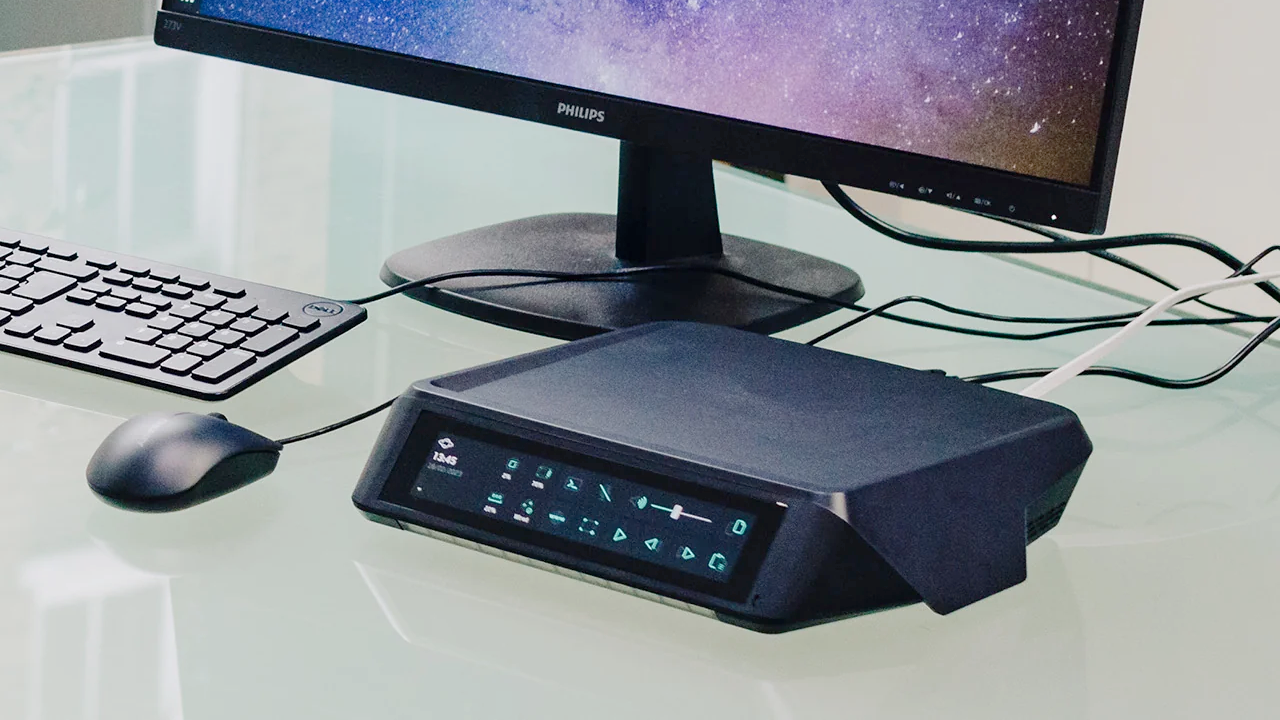Planet Launches Funky Arm-Based XR Mini Desktops with Touchscreens
These desktops have RockChip CPUs.

The market for Arm-based desktops is dominated by Apple these days largely because major PC makers yet have to ship their Arm-based parts running Microsoft's Windows. But smaller PC makers look to be a little more active. Recently Planet, a UK-based computer maker, introduced its PlanetPC XR1 Mini and PlanetPC XR2 Mini desktop systems that even have a touchscreen to additional controls.
Planet's XR1 Mini and XR2 Mini desktops are based on Rockchip's RK3568 and RK3588 system-on-chips, respectively. The RK3568 is a cheap SoC featuring four Cortex-A55 cores and Mali G52 graphics with two clusters making it more suitable for low-end smartphones or specialized devices.
By contrast, the RK3588 is a quite capable processor featuring four high-performance Cortex-A76 and four energy-efficient Cortex-A55 cores in DynamIQ configuration, a quad-cluster Arm Mali 'Odin' GPU, a 6 TOPS NPU accelerator, and an advanced media engine that can handle 8Kp30 video encoding as well as 8Kp60 video decoding.
The two systems come equipped with 4GB of LPDDR5 memory and 32GB of solid-state storage by default, but Planet can upgrade RAM to 16GB and storage to 1TB.
Both XR1 Mini and XR2 Mini share a chassis that measures 29×26×6 cm (11.4×10.2×2.36 inches) and comes with a distinct color touchscreen on the front panel offering quick access to soft keys for common tasks, a system monitor, and controls for Wi-Fi 6, Bluetooth, VPN, network disk, audio, and other system functionalities. Both PCs have all the I/O that one comes to expect from a desktop PC, including Wi-Fi, Ethernet, USB Type-A, HDMI, VGA/D-Sub, USB-C (RK3588 only), MicroSD, and audio connectors.
The systems run Ubuntu 20.04 and are positioned mostly for office work with some multimedia playback capabilities. But Planet's XR Mini PCs look quite expensive for their performance and features: the XR1 Mini is priced at $667 ($800 including VAT), whereas the XR2 Mini costs $840 ($1,008 including VAT).
Get Tom's Hardware's best news and in-depth reviews, straight to your inbox.

Anton Shilov is a contributing writer at Tom’s Hardware. Over the past couple of decades, he has covered everything from CPUs and GPUs to supercomputers and from modern process technologies and latest fab tools to high-tech industry trends.
-
bit_user This is pretty nuts. It seems like the kind of product that was essentially built on contract, for a big corporate customer, and then offered for public sale to try and find a bit more revenue.Reply
The systems run Ubuntu 20.04
Wow, I hope that's a typo. 15 months after 22.04 launched, and they're still on 20.04? I upgraded my Amlogic S922X SBC (ODROID-N2+) to 22.04 about a year ago, so it's not like a newer Ubuntu/ARM LTS hasn't been around.
Planet's XR Mini PCs look quite expensive for their performance and features: the XR1 Mini is priced at $667 ($800 including VAT), whereas the XR2 Mini costs $840 ($1,008 including VAT).
No kidding. Just get an Orage Pi 5 and forget about the touchscreen.
Both MediaTek and Qualcomm have better SoCs they could afford to use, for such a price. -
HideOut Theres like dozens of micro PC's in Pi like format that can run windows with this chip in it. But at about half the cost...Reply
So the question is, how much of a cut of sales does THG get from this post? -
usertests Reply
This was on CNX Software a couple of months ago. Neat design, nutty price.HideOut said:Theres like dozens of micro PC's in Pi like format that can run windows with this chip in it. But at about half the cost...
So the question is, how much of a cut of sales does THG get from this post? -
bit_user Reply
The sponsored posts on this site are all clearly labeled as such.HideOut said:So the question is, how much of a cut of sales does THG get from this post?
If it were a sponsored post, it would read more like a sales pitch and outline every positive aspect, plus probably having some sort of comparison against x86 office PCs or something like that. Instead, the article takes a decidedly skeptical tone.
I think this is merely a case of the author scrounging around for news on a Sunday, to fill out his quota or maybe make a little extra $. -
RichardtST Ubuntu, eh? Well that pretty much seals its fate. Ubuntu is dying. Ever since SNAP... and GNOME... and nothing actually works without lots of googling and configuring and cussing and swearing... Oh well.Reply -
bit_user Reply
I will say I hit a couple rough spots updating my ARM board from 20.04 to 22.04, and they were related to snaps.RichardtST said:Ubuntu, eh? Well that pretty much seals its fate. Ubuntu is dying. Ever since SNAP... and GNOME... and nothing actually works without lots of googling and configuring and cussing and swearing... Oh well.
However, my fresh installs of 22.04 on x86 machines have worked fine.
